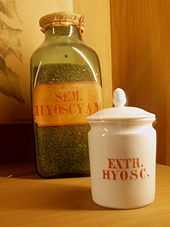Hyoscyamus niger
| Henbane | |
|---|---|
 | |
| Henbane | |
| Scientific classification | |
| Kingdom: | Plantae |
| (unranked): | Angiosperms |
| (unranked): | Eudicots |
| (unranked): | Asterids |
| Order: | Solanales |
| Family: | Solanaceae |
| Genus: | Hyoscyamus |
| Species: | H. niger |
| Binomial name | |
| Hyoscyamus niger L. | |
Hyoscyamus niger (commonly known as henbane),[1] also known as stinking nightshade or black henbane, is a plant of the family Solanaceae[1] that originated in Eurasia,[1] though it is now globally distributed.
Toxicity and historical usage
It was historically used in combination with other plants, such as mandrake, deadly nightshade, and datura as an anaesthetic potion, as well as for its psychoactive properties in "magic brews."[1][2][3] These psychoactive properties include visual hallucinations and a sensation of flight.[4] It was originally used in continental Europe, Asia, and the Arab world,[5] though it did spread to England in the Middle Ages. The use of henbane by the ancient Greeks was documented by Pliny. The plant, recorded as Herba Apollinaris, was used to yield oracles by the priestesses of Apollo.[1]
Recently evidence for its earlier use in the Scottish Neolithic has been debated.[6]).
The name henbane dates at least to AD 1265. The origins of the word are unclear, but "hen" probably originally meant death rather than referring to chickens.[7] Hyoscyamine, scopolamine, and other tropane alkaloids have been found in the foliage and seeds of the plant.[1] Common effects of henbane ingestion in humans include hallucinations,[1] dilated pupils, restlessness, and flushed skin. Less common symptoms, such as tachycardia, convulsions, vomiting, hypertension, hyperpyrexia, and ataxia, have all been noted.
Henbane can be toxic, even fatal, to animals in low doses. Not all animals are susceptible; for example, the larvae of some Lepidoptera species, including cabbage moths, eat henbane.
It was sometimes one of the ingredients in gruit, traditionally used in beers as a flavouring, until replaced by hops in the 11th to 16th centuries (the Bavarian Purity Law of 1516 outlawed ingredients other than barley, hops, yeast, and water).[8]
Henbane is thought to have been the "hebenon" poured into the ear of Hamlet's father,[2][9] although other candidates for hebenon exist.[10]
Misidentification

In 2008, celebrity chef Antony Worrall Thompson recommended henbane as a "tasty addition to salads" in the August 2008 issue of Healthy and Organic Living magazine. He subsequently said he had made an error, confusing the herb with fat hen, a member of the spinach family. He apologized, and the magazine sent subscribers an urgent message stating, "[henbane] is a very toxic plant and should never be eaten".[11]
Gallery
-

Hyoscyamus niger - MHNT
-

Henbane seeds
-
Henbane in flower
-

Henbane fruits
-

Large flowering henbane
References
- ↑ 1.0 1.1 1.2 1.3 1.4 1.5 1.6 Roberts 1998, p. 31.
- ↑ 2.0 2.1 Anthony John Carter MB FFARCS (March 2003). "Myths and mandrakes" (PDF). Journal of the Royal Society of Medicine 96 (3): 144–147. doi:10.1258/jrsm.96.3.144. PMC 539425. PMID 12612119.
- ↑ A. J. Carter (1996-12-21). "Narcosis and nightshade". British Medical Journal 313 (7072): 1630–1632. doi:10.1136/bmj.313.7072.1630. PMC 2359130. PMID 8991015.
- ↑ Schultes & Smith 1976, p. 22
- ↑ Joseph Perez, Janet Lloyd, The Spanish Inquisition, Yale University Press, 2006, ISBN 0-300-11982-8, ISBN 978-0-300-11982-4, p229 footnote 10]
- ↑ Black Henbane (Hyoscyamus niger L.) in the Scottish Neolithic, Journal of Archaeological Science (1999) 26, 45–52
- ↑ Anatoly Liberman, J. Lawrence Mitchell (2008). An Analytic Dictionary of English Etymology: An Introduction. U of Minnesota Press. pp. 108–110. ISBN 978-0-8166-5272-3.
- ↑ Dan Rabin, Carl Forget (1998). The Dictionary of Beer and Brewing. Taylor & Francis. xii. ISBN 978-1-57958-078-0.
- ↑ "Hebenon". Webster's Revised Unabridged Dictionary (1913 + 1828).
- ↑ Anatoly Liberman, J. Lawrence Mitchell (2008). An Analytic Dictionary of English Etymology: An Introduction. U of Minnesota Press. pp. 110–111. ISBN 978-0-8166-5272-3.
- ↑ Dawar, Anil (August 4, 2008). "TV chef Worrall Thompson recommends deadly weed as salad ingredient". The Guardian (London). Retrieved 2008-08-04.
References
- Roberts, Margaret F.; Wink, Michael (1998). Alkaloids: biochemistry, ecology, and medicinal applications. Springer. pp. 31–32. ISBN 0-306-45465-3. Retrieved 2006-12-27.
- Schultes, Richard Evans; Smith, Elmer W. (1976). "A Golden Guide to Hallucinogenic Plants". Golden Press. Retrieved 2008-05-26.
- "Henbane". Clinicalmind.com. Archived from the original on 2007-09-27. Retrieved 2007-08-18.
External links
| Wikimedia Commons has media related to Henbane. |
| ||||||||||||||
| ||||||||||||||||||||||||||||||||||||||||||||||||||||||||||||||||||||||||||||||||||||||||||||
